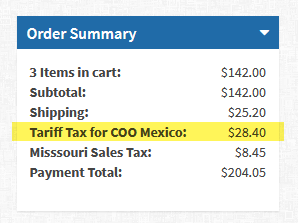Tax Codes
Table of Contents Show
Managing Tax Codes
NOTE: For information on setting up Tariffs, please refer to Managing Tariffs below.
A tax code in AbleCommerce is a merchant's custom setting that is used to trigger whether a product is subject to taxation. When a product is "taxable" by use of the tax code, AbleCommerce calculates taxes according to the tax rules that were assigned to the tax code. The tax rules you create will tell AbleCommerce what rate to apply and to what location. A tax code can be associated to products, shipping charges, or gift wrap. Any taxable item in the order will be flagged for having a potential tax calculation applied. Each tax rule is based on location so taxes cannot be determined until the customer enters an address for the order.
After the customer's address is known, any applicable taxes are calculated. If any adjustments are made to the order, such as a coupon or discount, taxes are recalculated on the discounted price.
In most situations, a merchant only needs a single tax code. When the tax code is applied to the product, the product becomes eligible for taxation according to the tax rules. Tax codes are not configurable. They merely classify, or group, the tax rules that are assigned to them.
If you sell items that have different tax rates, then you will need to create tax codes for each type of product. For example, merchants that sell wine might need to charge a different tax rate for the wine then for the other non-alcoholic items they sell.
From the menu, go to Configure > Taxes > Tax Codes to view a page similar to the one below.
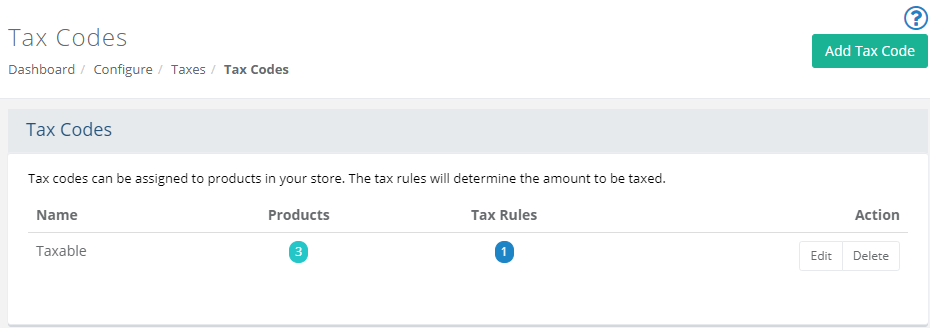
The Tax Codes listing page is shown.
The Name column lists all tax codes that have been created regardless if they are in use or not.
The Products column has a counter showing the number of items that are assigned to the tax code.
The Tax Rules column has a counter showing the number of tax rules that will be applied for the products assigned to the corresponding tax code.
The Action column allows you to Edit the name of the tax code, or Delete the tax code.
Add or Edit a Tax Code
From the upper-right corner, click the Add Tax Code button to view a popup.
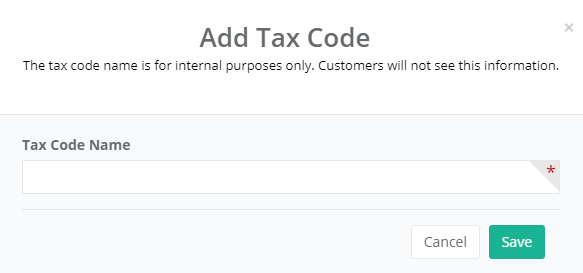
Enter the Tax Code Name of your choosing. The code name is for internal use only.
Click the Save button.
The new record appears in the Tax Codes list.
To change the tax code name, click the Edit button from the Action column. A pop-up form will appear where you can change the name as needed.
Click the SAVE button when finished.
NOTE: The tax code must have at least one tax rule and be assigned to a product.
Assigning Products to a Tax Code
After creating a new tax code, you can assign products to it. There are a few methods available:
Search and Assign - to assign several products to a tax code, click on the linked number counter in the Products column for the tax code you want to assign.
Batch Edit - to change or update several products with different tax codes, go to the Catalog > Batch Edit > Products page and follow the instructions there.
Edit a Single Product - go to the product editing page, which is available from the Catalog > Products page. Select a product to edit. From the default tab named 'Product', find the section named "Shipping and Tax" and select a tax code from the Tax Code field option.
Search and Assign Products to a Tax Code
From the menu, go to the Configure > Taxes > Tax Codes page to view a list of tax codes previously created.
NOTE: Typically, a store will only need a single tax code.To assign a tax code to products, click on the linked number counter in the 'Products' column for the applicable tax code.
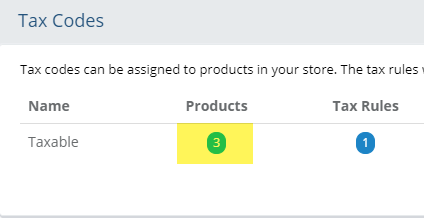
This will bring you to the Search Products form, which is similar to the one shown below.
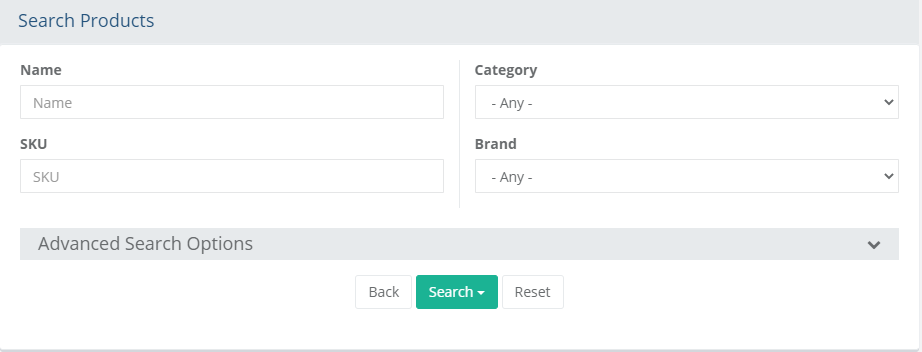
The top section provides common search fields and options that can be used to find a one or more products. If you want additional search options, then click on the Advanced Search Options header to expand a section with additional search criteria. Reference the sample screenshot below:
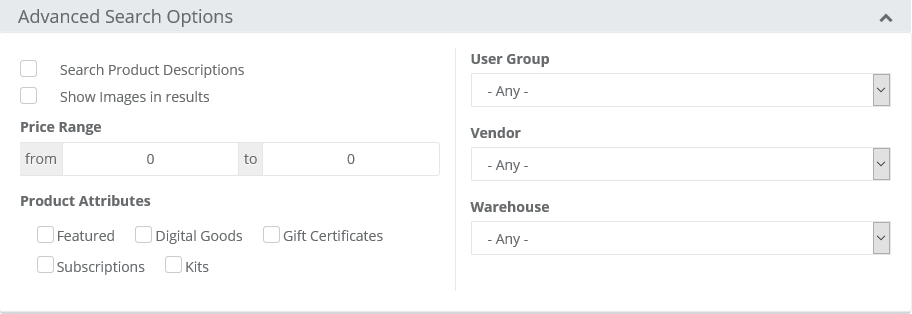
Using the search form(s) provided, find the products that will be assigned to the tax code selected from the prior page.
After entering the search criteria, press the Search button which will drop-down to provide 3 additional filters:
- All Products: results include all products regardless of their assignment to tax code.
- Assigned Products: results include only the products that are assigned to the selected tax code.
- Unassigned Products: results include only products that are not assigned to the selected tax code.
By default, the search results show any products that are currently assigned to the selected tax code. Reference sample below:
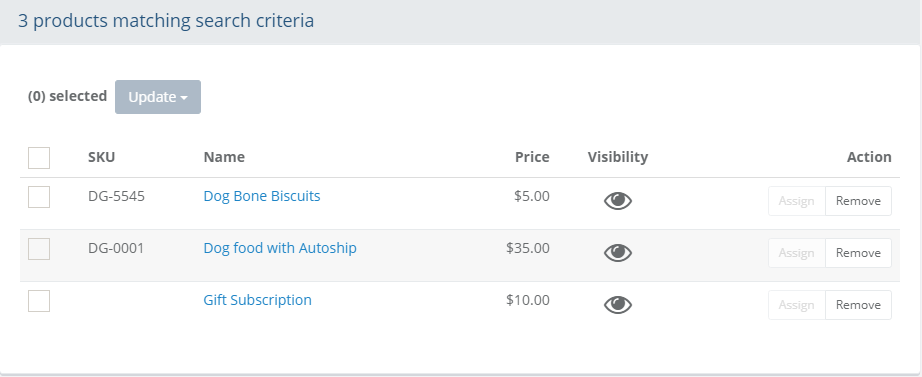
You can either use the buttons from the Action column to individually Assign or Remove product associations, or..
Check the box next to one or more products, or check the box at the top of the first column to quickly select all products in the search results.
This will activate the Update button, which will drop-down to provide 2 options: either Assign or Remove the selected products.
The update will take place immediately after selection.

When finished assigning products, click the BACK button to return to the Tax Codes page.
Adding or Changing a Product's Tax Code
From the Catalog menu, go to the Edit Product page for any product.
When you add or edit a product, you can select the Tax Code from the Shipping and Tax section.
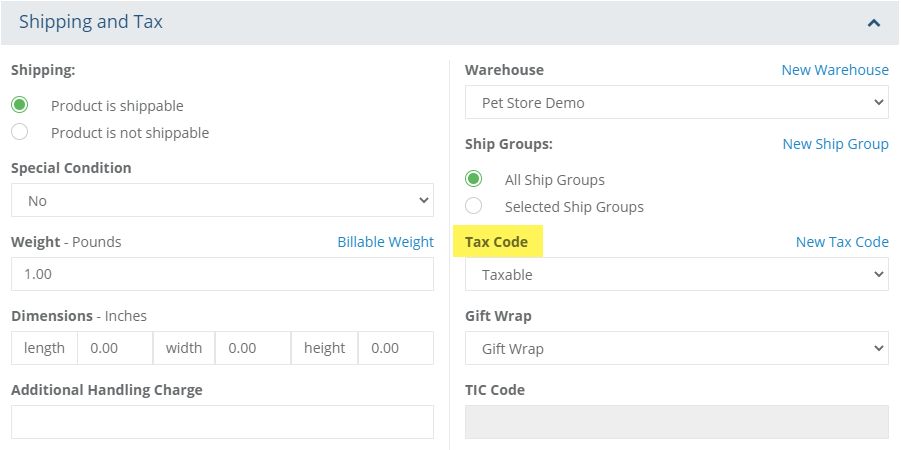
If a tax code is selected, the product becomes taxable according to the tax rule(s).
Adding or Changing a Shipping Method's Tax Code
From the Configure > Shipping > Methods menu, edit a shipping method.
When you add or edit a shipping method, you can select the Shipping Tax Code.
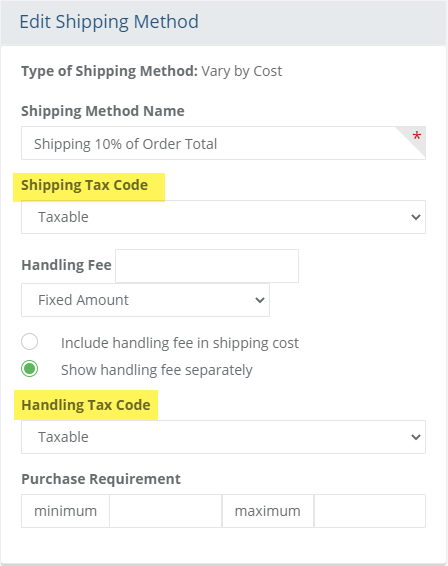
If you make a shipping method taxable, the amount calculated for the selected shipping rate is taxed according to the tax rule(s).
The additional tax on the shipping charge is combined with any other taxes for the order.A Handling Fee can also be taxed, but it must have the Show separately option selected.
Select the same or a different Handling Tax Code.
Adding or Changing a Gift Wrap's Tax Code
From the Catalog > Gift Wrap menu, edit a gift wrap style.
When you add or edit a gift wrap choice, you can select the Tax Code.
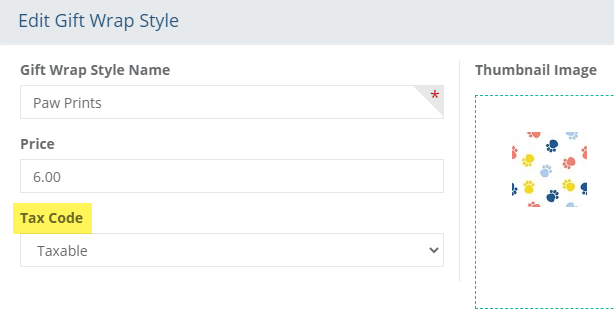
If you make the gift wrap taxable, the amount calculated for the selected gift wrap is taxed according to the tax rule(s).
The additional tax on the gift wrap is combined with any other taxes for the order.
Managing Tariffs
Under the current Trump regime, tariffs are being imposed on goods purchased from many countries. The tariff can be specific to a product type and based on the country of origin (CoO). AbleCommerce can easily support the new tariffs using tax codes and tax rules. If your plan is to pass on the tariff to your customers, it can be done within AbleCommerce by creating new tax codes. We have outlined the steps below:
STEP ONE: Create a Tax Code for each Country of Origin
The first step is to determine which products have the same country of origin and what the tariff rate will be.
Create a new Tax Code in AbleCommerce for each country of origin.

Name the Tax Code accordingly so it will be identifiable by CoO. The name is for internal use only.
STEP TWO: Create a Tax Rule that uses the applicable rate for the Country of Origin.
The next step is to determine the tax rate for the tariff and name it accordingly. The name will be displayed to customers.
It is not necessary to apply the tax rule to any specific location as this is calculated for each product that the tax code is assigned to.
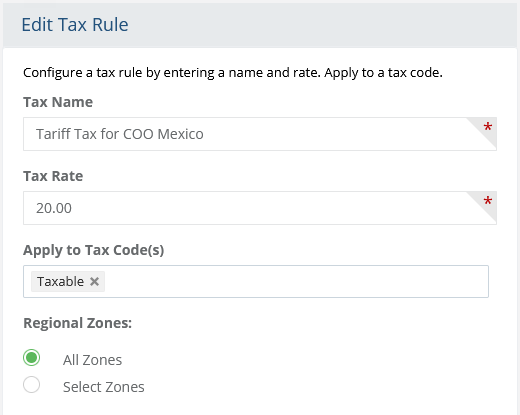
STEP THREE: If you have existing tax rules, apply those for each new tax code.
Let's say, for example, that you have a state sales tax for Missouri. To make sure the existing sales tax is calculated along with the tariff, you will need to copy the tax rule for each new tax code.

STEP FOUR: Apply the tax codes to the products based on country of origin.

Applying tax codes to products can be done in a number of ways.
Edit the product individually to assign a tax code (as shown above).
Use the Find and Assign page to search for products and assign the applicable tax code.
Use Product Batch Edit to update several products at once.
Use the Product Import with a CSV file to update all products at once.
FINAL RESULT
Upon checkout, the customer will see the tariff calculation for the product(s) purchased. If there is a second sales tax, that will be applied as normal.
